 Olympus aims squarely at pro market, announces plans for Pro Services division.
Olympus aims squarely at pro market, announces plans for Pro Services division.
By
Dave Etchells
(Wednesday, June 25, 2003 - 15:37 EDT)
At the Olympus press event Tuesday evening in New York City, Olympus' intentions for the E1 were made crystal-clear -- It's all about the professional market.
I attended the Olympus press event for the E1 rollout in New York City tonight (I'm writing this from my hotel room, late Tuesday evening, although it will probably be tomorrow sometime before I manage to post the story, due to internet connection problems at my hotel.) It was the usual New York press gala, complete with a supermodel to accent the company's wares, ample high-quality food, and a large crop of the "usual suspects" national photo press crew. Overall, a well-done event, although a little more air conditioning would have been nice in light of the muggy New York weather.
At the event, my positive first impressions of the E1 camera were reinforced by Olympus' clear message that they really intend the E1 to be a professional product more than a "prosumer" one. (Although plenty of well-heeled consumers will likely purchase E1s.)
In the very brief time that we had our hands on the E1 prototype, it was clear that it was an exceptionally ruggedly-built digicam. While its weight and price are more in the league of Nikon's D100 or Canon's EOS-10D, its build quality is much more in the range of the Nikon D1x or Canon EOS-1D. -- And it incorporates technology that is literally unique. (Automatic in-camera correction for lens distortion, frame-transfer CCD for improved dynamic range, double-aspheric elements in its lenses, etc.)
I think the natural tendency of many of us who looked at the E1 was to initially lump it in with lesser SLRs in the "prosumer" range, due to its size and price, and more than a little bit because we're not accustomed to thinking of Olympus as a provider of cameras to the professional marketplace. The more I see of the camera's capabilties, and the technology and care in manufacturing that Olympus appears to be lavishing on it though, the more I'm becoming convinced that the E1 truly is a professional-level SLR. I don't know that I'd put it in the same range as the D1x or 1Ds (it loses some points to those cameras in the area of autofocus sophistication), but on the other hand it does offer unique capabilities not found in even those high-end models.
I suspect I'm not alone in my initial assumptions about the E1, and that points to the key problem for Olympus in the marketplace: Getting pros to take them seriously as a provider of professional products.
To that end, the most significant announcement at the press event (IMHO) was that Olympus is planning to set up a "Professional Services" operation, dedicated to meeting the needs of professional shooters using the E1 system. This organization would presumably provide services on the level of those offered by Canon Professional Services (CPS) and Nikon Professional Services (NPS), both of which are well-known to practicing pros.
If this is indeed Olympus' intent (and it does appear to be, based on conversations I had with Olympus staff after the obligatory speeches and ritual feeding/drinking were over), it's a very significant development. Setting up a professional services division is both incredibly expensive undertaking, and genuinely necessary to attracting serious interest from professional shooters. Olympus clearly faces an uphill battle to move into the professional market (you can bet that Canon and Nikon aren't standing still, either), but they appear to be quite serious in the endeavor, and willing to commit very significant resources to the battle.
Of course, it doesn't matter how good a professional services division you create, if the products it supports don't measure up to professional expectations. An awful lot will thus be riding on the performance of production models of the E1. I did spend some time chatting with the various pros who were at the press event, who'd had some hands-on with the E1, and was surprised by the level of enthusiasm they exhibited for the product.

Of course, this was an Olympus press event, and the pros in question were all there at the invitation of Olympus, but after attending a great many such occasions, I think I've developed a reasonable filter through which to interpret the comments of "company-friendly" pros. In this case, I was a little surprised by the candor many displayed in talking about some of Olympus' previous products that were supposedly pro-level. Several were polite, but clearly dismissive of the earlier E20 camera, citing a lack of responsiveness and particularly singling out its long write times to the memory card. By contrast, it was hard to escape the feeling that anyone who'd worked with it really liked the E1 -- I didn't detect any hidden reservations or sugar-coating of their perceptions of the new model. The enthusiasm seemed pretty genuine.
Still, it's hard to project what will happen to the E1 in the marketplace. It has many unique features and (potential, anyway) significant advances that could positively impact image quality. On the other hand, it's not likely that a pro with a bagful of Nikon glass, an F5 and a pair of N90s will march out and buy an E1 with a kit of lenses. On the other hand, they might well entice young pros without a massive "kit" and high-end enthusiasts on the strength of their technology alone. Stay tuned, it's going to be an interesting year in the D-SLR market!
----
(For those interested, here are some slides from an Olympus PowerPoint presentation (used with permission), showing Olympus' positioning of the E1 vs competing D-SLRs)
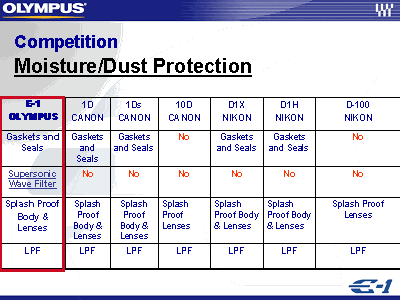
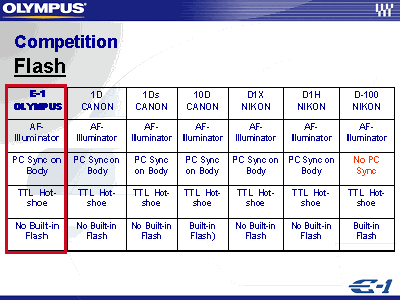
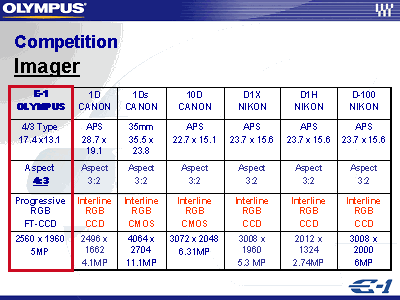
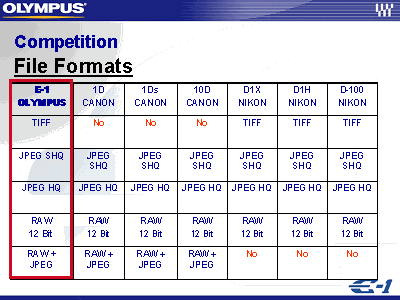
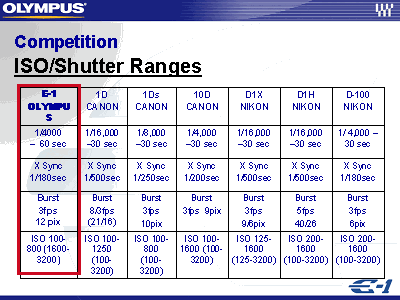
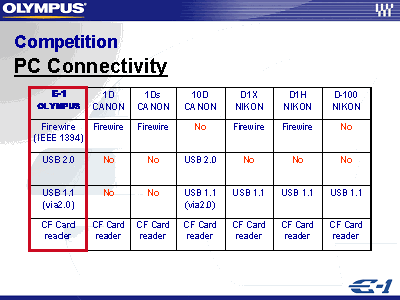
|